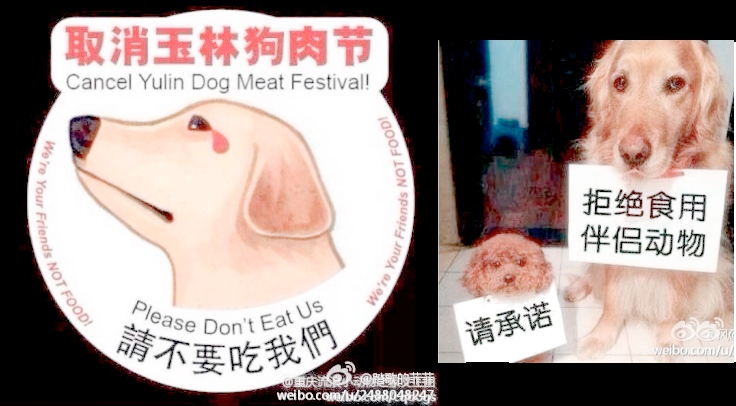In some parts of China, dog meat is considered a delicacy at the dinner table and the practice of consuming dog meat has been around [1] since 500BC, or possibly even earlier. However, as more and more Chinese are raising dogs as pets nowadays, they consider eating dog meat as cruel and barbaric behaviour.
In the past few years, animal rights activists have launched several campaigns, both online [2] and offline [3], against the consumption of dog meat. Every year, they call for the abolition of the annual dog meat festival [4] which involves eating dog meat hotpot with lychees and drinking strong liquor. The event takes place in Yulin city, Guangxi province on the summer solstice of the lunar calendar. This year, the date is June 21. On the other hand, local residents claim that the festival is part of the city's cultural heritage and traditional practices.
Last year, animal rights activists estimated that more than 10,000 dogs were killed during the festival. Below is Apple Daily's report on the preparation of dog meat in the 2013 festival:
This year's anti-dog meat festival campaign started in early May. A number of celebrities such as Chen Kun and Yang Mi have spoken out [5] for the abolition of the festival since then. As the festival is approaching, in Sina Weibo, Chinese netizens have started tweeting anti-dog meat festival messages. Here is a typical campaign [6] message written by Weibo user “Singing Feifei” (@踏歌的菲菲) with two campaign stickers attached:
 [6]
[6]Two campaign stickers against the dog meat festival circulated on Weibo. Via “Singer Feifei” Weibo.
为什么要有狗肉节?!把人装在笼子里,看着自己的同伴一个一个被杀,自己等待被宰杀,那种绝望的眼神再让人类自己看看!
Why do we need the dog meat festival?! Imagine putting humans into a cage and watching each other get killed while waiting for your turn. The desperate look in their eyes.
With popular support, animal rights activists went to Yulin to lobby the local government [7] to stop the festival. In addition to the animal rights perspective, they put forward the food security and legal argument [7] as the Ministry of Agriculture had issued a quarantine regulation on dogs and cats last year, requiring laboratory quarantine for the animals before they are transported. While the laboratory quarantine would cost 200 yuan to 300 yuan per dog (approximately US 30-48 dollars), local residents would not be willing to bear the cost.
To avoid the accusation that the authorities are involved in encouraging the illegal consumption of dog meat, Yulin government sent out a press release on June 6 [8] [zh] that “there is no such thing as “Summer Solstice Lychee Dog Meat Festival” and that the so-called festival “has never been initiated by any government or civic organization… it is a form of social gathering during the summer solstice”.
While the Yulin government is washing their hand off the festival, dog meat lovers and Yulin residents are fighting back saying that animal right activists have no right to stop people [9] [zh] from eating dog meat.
The Chinese food culture and individual rights argument have also found a lot of echoes from Chinese social media. For example “Xiya protector” (@希瓦的守护 [10]) said:
我个人很喜欢狗,也从不吃狗肉,但是我不会也没有理由反对玉林人吃狗肉,一个人不能因为自己的个人喜好而去否定其他人的喜好。
I like dog and have never eaten dog meat, but I can't find any reason to oppose Yulin people from eating dog meat. An individual cannot negate others choices because of one's preference.
Lu Daheng (@卢-达恒 [11]) believed the controversy is a reflection of cultural conflict:
狗是我们的朋友不能吃,这其实是西方传入来中国的思想 而玉林吃狗节系当地传统节日狗肉能不能吃表面上看系人同狗的问题 其实这是东方和西方思想碰撞问题 广西玉林"狗肉节"
Lu Daheng: Dog as people's friend and cannot be eaten. Such an idea is coming from the western world. Yulin's dog meat festival is a local tradition. The argument that dog meat cannot be eaten is not about human's relation with dog as it seems, but the conflict between eastern and western thought.
So far the most convincing argument is about food security. The compromise would be a system to guarantee the security of dog meat rather than a straightforward ban. Doctor Lui Lang in Weibo suggested [12]:
如果我们要保证狗肉的食品安全,那么就必须从源头抓起,要有规范的养殖场,同时还要有严格的养殖档案和每只犬的外在标示,以方便可追溯。合理的防疫和驱虫 […] 这样下来的狗肉价格应该超过进口牛肉。
If we are to guarantee the food security of dog meat, the breeding farms should be regulated. Every dog should be marked so that if there is any thing wrong, it can be traced back to the farm. The dogs should have vaccines and take medicine to clear parasites. […] If all the measures are taken, the price of dog meat would be more expensive that beef.
But animal rights activists are not happy with the trade-off. Disaur exclaimed [13]:
我们抵制狗肉节,抵制吃狗肉,当然,我们也永远不吃狗肉。吃狗肉与否,诚然,是每个人的自由,我们无权干涉。但我们呼吁大家共同抵制所谓狗肉节,谴责屠宰、制售狗肉的商家。贩售、屠宰猫狗永远不可能合法化 […]
We boycott the dog meat festival and the eating of dog. We will never eat dog meat. Of course, the consumption of dog meat is individual's freedom and we have no right to interfere. But we have to boycott the dog meat festival, condemn the slaughters and the dog traders. There is no way the trading and slaughtering of cats and dogs can be legalized [… ]